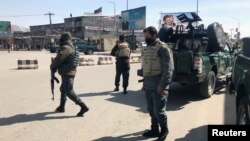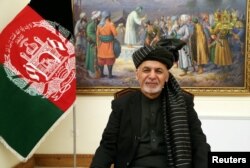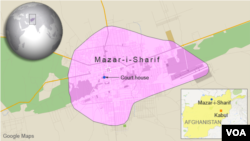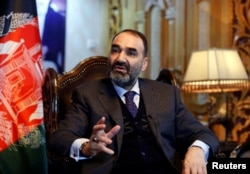The dismissal of a provincial police chief in northern Afghanistan triggered armed clashes Thursday between his loyalists and national security forces, in another challenge facing the beleaguered Afghan government.
The crisis erupted Wednesday evening when President Ashraf Ghani appointed Abdul Raqib Mubariz as the new chief of the Balkh province, citing a “worsening security situation” there.
But the ousted police chief, Akram Sami, refused to step down in defiance of the presidential decree and his loyalists took up positions in parts of the provincial capital of Mazar-e-Sharif to resist the move.
The new provincial police head, accompanied by special security forces, arrived in the city Thursday morning to assume control of the city before gunfire erupted.
Residents in Mazar-e-Sharif said both sides used light and heavy weapons in “sporadic clashes.” A city hospital official confirmed to VOA they are treating at least seven people injured in the clashes, including five civilians.
“Unfortunately his predecessor, Akram Sami, is not willing to leave his post and accept the new appointment,” General Khoshal Sadat, the deputy interior minister security, said while defending the deployment of special forces to travel with Mubariz.
A provincial government spokesman late Thursday afternoon told VOA that special forces have taken control of the provincial police headquarters. It was not immediately known whether the overall situation in Mazar-i-Sharif had also been brought under control.
The United Nations Assistance Mission in Afghanistan (UNAMA) called for the tensions to be quickly resolved.
“UNAMA notes with a great concern the escalating tensions in Mazar-e-Sharif. The Mission calls on all parties to deescalate tensions immediately, find a non-violent solution to solve current differences, and prioritize the safety and security of the city’s residents,” the mission said.
The United States, which is funding and training Afghan security forces, denounced as “unacceptable” the infighting in and areas surrounding Mazar-e-Sharif.
“We call on leaders to tell military and police forces to stand down, and for political leaders on both sides of this dispute to put the Afghan people first,” tweeted U.S. ambassador to Kabul, John Bass. "Afghan security forces are tasked with protecting the Afghan people, not fighting each other over political disputes ... the only ones who benefit from this violence are the Taliban,” Bass warned.
President Ghani faced a similar crisis last year when he removed the then governor of Balkh, Atta Mohammad Noor, although the regional political strongman refused to step down. The months-long crisis ended after Ghani appointed Sami as Balkh’s police chief to meet one of Noor’s key demands for relinquishing the charge.
In a formal statement, Noor denounced Sami’s removal as a violation of the agreement he had reached with Ghani last year. The former governor urged residents in Mazar-e-Sharif to stay away from work and businesses to protest the dismissal of the police chief, saying our people have been attacked and we are ready to defend ourselves.”
Using a controversial presidential decree, Ghani in January dismissed a senior member of his ruling coalition, but the second deputy chief executive, Mohammad Mohaqiq, still has not stepped down.
Chief Executive Abdullah Abdullah declared Mohaqiq’s dismissal as a violation of the political deal he had reached with Ghani in September 2014. That led to the formation of the National Unity government, or NUG, to end months of political crisis that stemmed from the fraud-marred presidential election.
Ghani became the president and his election rival Abdullah Abdullah became head of the newly created office of the chief executive under a deal mediated by the United States.
The Afghan government has since been plagued by political tensions and bickering over appointments, as well as policy issues, bringing it under sustained criticism. Critics also blame a lack of unity in the so called "unity government" for worsening nationwide security in the wake of battlefield gains by Taliban insurgents.







